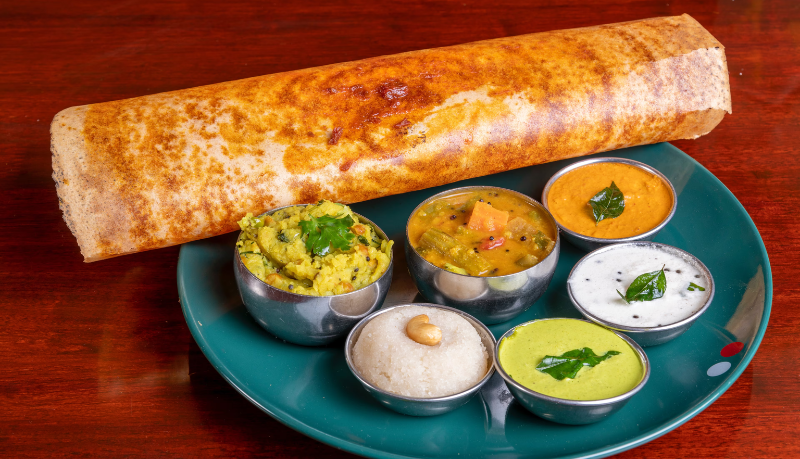Welcome to a flavorful journey into the heart of South Indian cuisine, a culinary tradition where every dish tells a story of culture, climate, and community. Among the plethora of ingredients that define this cuisine, one stands out for its versatility, richness, and cultural significance: the coconut.
This blog delves into the pivotal role coconut plays in South Indian culinary practices, shaping not just the region’s food but also its cultural identity.
Coconut: The Culinary Heartbeat of South India
In the lush landscapes of South India, where the air is thick with the scent of spices, the coconut palm sways gracefully, rooted as much in the soil as in the region’s culinary ethos.
Known as “Kalpavriksha” or the wish-granting tree in ancient Sanskrit texts, the coconut is integral to South Indian life and cuisine. Every part of the coconut tree is utilized, making it a symbol of sustainability and ingenuity.
A Versatile Ingredient
Coconut’s versatility is unmatched; it can transform a dish’s texture, enrich its flavor, and elevate its nutritional profile. From the grated flesh that adds a creamy richness to curries and stews, to the coconut milk that forms the base of soothing soups and delightful desserts, coconut is a staple that South Indian kitchens cannot do without.
Even coconut oil, with its distinctive aroma, is a preferred medium for frying and sautéing, infusing dishes with a unique flavor that’s instantly recognizable.
Cultural Significance and Symbolism
More than just a culinary ingredient, the coconut holds profound cultural and spiritual significance in South India. It’s a symbol of prosperity and purity, often used in religious rituals and ceremonies to represent the divine.
The breaking of a coconut is considered auspicious, symbolizing the removal of obstacles and the offering of one’s ego to the divine, a practice that beautifully illustrates the deep intertwining of food and spirituality in South Indian culture.
The Flavors of Tradition: Coconut in South Indian Dishes
South Indian cuisine, known for its bold flavors and intricate spice blends, relies on coconut to add depth and balance. Here are a few iconic dishes where coconut plays a starring role:
- Sambar and Rasam: These staple soups feature a hint of coconut, adding a layer of complexity to their tangy and spicy profiles.
- Coconut Chutney: A beloved accompaniment to idlis and dosas, this chutney is a blend of grated coconut, green chillies, and a dash of spices, showcasing coconut’s ability to harmonize with other flavors.
- Fish Curry: Coastal regions leverage coconut milk to create rich, creamy fish curries that are both hearty and heartwarming.
- Payasam: A festive dessert, payasam uses coconut milk to achieve its signature creamy texture, often enhanced with cardamom and nuts for extra flavor.
Coconut’s Health Benefits
The health benefits of coconut are as extensive as its culinary uses. Rich in fiber, vitamins, and minerals, coconut can boost metabolism, improve heart health, and provide a quick source of energy. The medium-chain triglycerides (MCTs) in coconut oil are known for their weight management properties, making coconut not just a delicious but also a nutritious addition to the South Indian diet.
Sustainability and Eco-friendliness
The coconut tree is a marvel of sustainability. Beyond its culinary uses, every part of the tree finds a purpose – the shells as utensils, the husks for coir, and the leaves for roofing.
This zero-waste approach reflects the South Indian ethos of respect and reverence for nature, underscoring the coconut’s role in promoting eco-friendly practices.
Yenna Dosa:
In the bustling culinary landscape of Bibvewadi Pune, Yenna Dosa stands out as a beacon of authentic South Indian cuisine. Celebrated as one of the best authentic restaurants in the area, it pays homage to an ingredient at the heart of South Indian cooking: the coconut.
Yenna Dosa’s menu showcases the coconut’s versatility, from creamy chutneys that grace fluffy idlis to rich curries that whisper tales of distant shores.
This beloved eatery not only brings the traditional flavors of the South to the table but also embodies the cultural and nutritional essence of the coconut.
Through its dishes, Yenna Dosa invites patrons on a culinary journey, making it a landmark for those in Bibvewadi Pune seeking an authentic taste of South Indian heritage.
For more details contact us at:
Yenna Dosa, Otta no 248,opp Kothari block, Bibvewadi, Pune, Maharashtra 411307
7522909090
Conclusion
The coconut’s role in South Indian cuisine transcends its culinary uses, symbolizing the region’s rich heritage and vibrant traditions. Establishments like Yenna Dosa play a crucial part in preserving this heritage, offering a window into the soulful world of South Indian cuisine.
Through their dedication to authenticity, restaurants like Yenna Dosa ensure that the story of the coconut—and the flavors it brings to life—continues to enchant and nourish.



